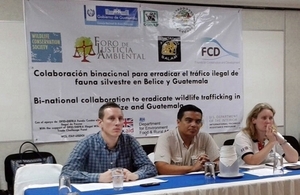United Kingdom supports project to eradicate Wildlife Trafficking in Belize and Guatemala
The British Ambassador to Guatemala, Sarah Dickson, visited today the Guatemalan department of Petén.

Ambassador Sarah Dickson in Peten
Ambassador Dickson launched a three year project aimed at eradicating cross-frontier wildlife trafficking in the Chiquibul-Maya Mountains eco-region of Belize and Guatemala through strengthened intelligence, law enforcement and prosecution, and improved awareness to deter trade in highly endangered parrots.
The British Government is financing part of this project with £389,911 from 2015 to 2018 with funds from the Department for International Development (DFID) and the Department for Environment Food and Rural Affairs (DEFRA). Other participants in the initiative include the US Department of Interior and the Governments of Belize and Guatemala.
The implementer, Wildlife Conservation Society (WCS), will work with local civil society organizations to mobilize improved coordination between governments by supporting national, bilateral, and multilateral initiatives that protect emblematic species, conserve natural resources, and propel economic alternatives for rural communities on targeted wildlife trade routes.
The project partners in Guatemala are the National Council of Protected Areas (CONAP), the Guatemalan General Attorney’s Office, Association Balam, the Forum of Environmental Justice of Petén and the Division of Agents for the Protection of Wildlife of the National Police (DIPRONA). In Belize key associates include the Ministry of Forests, Fisheries and Sustainable Development; the Forest Department, the National Police and the organization Friends for Conservation and Development (FCD).
The project is focused on five goals that are to be reached in three years (2015-2018):
- Scarlet macaw nest protection (Belize)
- Prosecution of Illegal wildlife trafficking (Guatemala)
- Binational collaboration (Guatemala, Belize)
- Economic alternatives for rural communities (Guatemala)
- Greater public awareness (Guatemala, Belize)
The progressive loss of biodiversity in Guatemala and Belize involves loss of genetic material of flora and fauna with potential use in research interest, commercial rational use by communities, tourism and many others. One of the activities that contribute to the biodiversity loss level It is the illegal wildlife trafficking.
The launch of this project follows the visit in May of the Foreign Secretary’s Special Representative for Climate Change, Sir David King, who met with senior officials on a wide range of environmental-policy issues, including; global climate change negotiations, local environment-related legislation, and Guatemala’s leadership in regional discussions for a sustainable future.